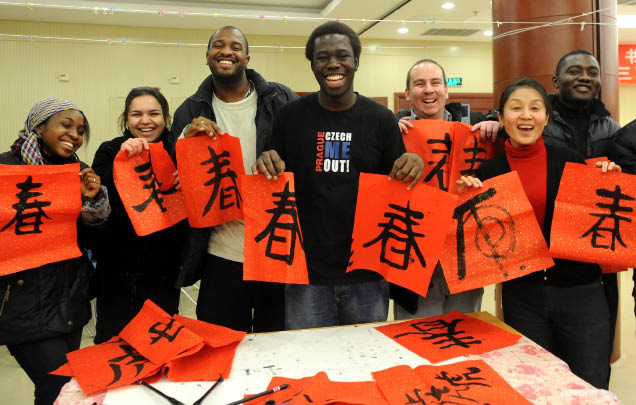| A Foreign Education in China
By staff reporter JIAO FENG
SINCE the first batch of foreign students – 33 eastern Europeans – came to Beijing to study in 1950, their number in China has seen a continuous increase. According to statistics from the Ministry of Education (MOE), China has welcomed a total of 1.69 million students from 190 countries and regions; currently there are nearly 240,000 foreign students in China. In November 2009 U.S. president Barack Obama announced on his visit to China that from 2010 to 2013 the U.S. would send 100,000 Americans to follow suit.
Today over 610 Chinese institutions of higher learning are eligible to receive foreign students. The programs they provide include Chinese, Traditional Chinese Medicine, economics, law and management. Batches of foreign students finish their studies in China and head home, serving as a bridge and bond linking China to their part of the world. Their choices have greatly enhanced understanding and friendship between Chinese people and other peoples throughout the world.
Adore Chinese Culture
 |
| Foreign students at Beijing Jiaotong University display their calligraphy works written for the 2010 Spring Festival. China Foto Press |
Hassan Akhssass from Morocco has studied Chinese language and literature at Beijing Foreign Studies University (BFSU) for less than a year. Asked about his mandarin skills, he replied self-deprecatingly “mama huhu,” meaning “I can just manage,” which is an expression of modesty. He adds, “Chinese culture is very interesting and I would like to learn more, so I need to study hard.”
Compared to Hassan Akhssass, You Dahai from Romania is more openly confident. This Romanian chose You Dahai (literarily meaning “to swim in the sea”) as his Chinese name. Three years ago You Dahai started to take Master’s level philosophy courses at Peking University. “Chinese philosophy is very deep and difficult to understand; it is completely different from Western philosophy,” in his opinion. His Mandarin is very fluent; in fact he once won 10th place in the “Chinese Bridge” Chinese Proficiency Competition for Foreign College Students.
Binod Singh from India started learning Mandarin before coming to China. He says he came to learn about Chinese culture as China was playing a more and more important role in world affairs. After graduation he became a teacher and hopes that he can help Chinese people get to know Indian culture.
Dr. Tian Chenshan, director of the School of International Relations of BFSU and a teacher at the Council on International Educational Exchange (CIEE) in Peking University, tells China Today that when he taught in the U.S. in 2003, few American universities had a China Research Center, but now such centers are prevalent in American universities. Moreover, credits earned at some Chinese institutions are recognized by U.S. colleges now, which allows American students to apply course credits earned in China towards a degree. “An increasing number of American students are taking a great interest in China. They learn Mandarin in order to understand more about the country,” says Tian.
Along with fast economic growth, China’s expanding international influence means more people are taking an interest in traditional Chinese culture. That explains why the number of foreign students coming to China keeps climbing. They come for bachelor, master and doctoral degrees, unlike in the past for basic language preparatory courses. The availability of scholarships has steadily increased. According to statistics from the MOE, annual Chinese national scholarships to international students have reached RMB 800 million and provincial scholarships have hit about RMB 110 million. So far over 20,000 students have benefited from the open arms of academia and government.
| 